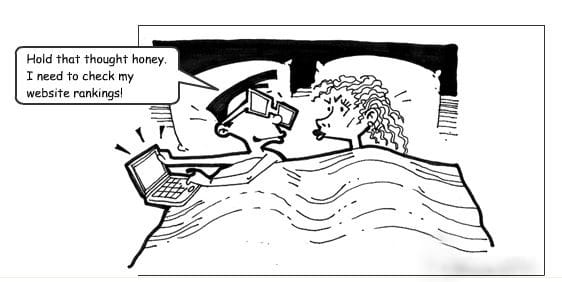Five Typical Reasons Your Website Won’t Rank: These days, most people building websites do so with a keen eye for SEO. Webmasters and business owners know that to be successful and rank highly in the search engine results pages, their sites must be well-built, well-designed and fully optimised.
Sometimes, however, even these measures won’t guarantee your online success. Even the most SEO-friendly sites can fail to attract visitors, leaving all singing, all dancing web pages languishing forlornly on pages two, three, four or even lower on the search engine results listings. If you’ve recently built a site, but don’t see the results you want, there could be several reasons for your underperformance. Keep reading to discover the five most common reasons behind a lack of SEO success.
1. Competition
One of the main reasons your website may not be ranking highly is the fierce online competition in your industry. If one or more of your competitors has been active online for a long time, they’ve probably established a well-rounded link profile and strong content, which means they will usually be in prime positions in the rankings.
The stiffer the competition you face in your industry, the stronger your website would need to be to rank on the first page for the most sort after keywords. Rather than competing with larger companies and established names for standard industry search terms, try to get an online edge by opting for long-tail keywords instead. Use geographic names or specific times to try and corner your local market or industry niche, researching relevant keywords before embarking on an online blitz.
2. Lack of optimisation
Your poor online performance could be a lack of proper on-page SEO. If you haven’t taken care of essential SEO elements, the search engines won’t be able to identify what your site is about and may be unable to decide if your URL is trustworthy.
To ensure your website performs as well as possible with the search engines, go back to basics and provide all the leading SEO elements are in place. Ensure your page titles, title tags, meta descriptions, image tags and other on-page optimisations are as full and complete as possible. Create an XML sitemap so that Google can easily index your site and check that your content is relevant to your chosen keywords.
3. Not enough content
Thin-content is another common cause of poor page rankings. If your site is low on content, it may not contain enough information for the search engines to assess it properly. In general, places that are content-rich perform better with Google and other search engines, primarily if that content is well-written, relevant and trustworthy.
Though bulking out a website takes a little time, it’s relatively easy. Spend a few hours adding descriptions, images and links to your site to help inform the search engines and give site visitors a better idea of what your pages are about. The more informative and interesting you make your content, the more valuable visitors will find it and the more likely they’ll be to explore your site, link to your page and use your services. This is an excellent way to improve SEO and organically boost your page ranking, building a solid customer base as you go.
Adding a blog to a site can also help to boost its performance. Update with high-quality content every week, adding image titles, headings and links to each post to make it as SEO-friendly as possible. Include relevant keywords in your blogs, titles and headings to boost your SEO further.
4. Poor link building
Link building has always been important for SEO; search engines view incoming links as a sign of approval and trustworthiness, a sort of digital word-of-mouth recommendation. Links from relevant, authoritative sites are seen as exceptionally trustworthy and carry much weight with search engines. Build connections with other businesses by including outbound links in your blog and ask related companies to do the same for you.
Links from social media sites can also be very beneficial. So try to promote any special offers, new blogs or new products on Twitter, Facebook and other relevant sites to encourage users to link to your page.
5. Black Hat SEO
When search engines first hit the web, people in charge of building websites used several tactics to boost their pages up the search engine results page artificially. Known as ‘Black Hat SEO’, these techniques are likely to result in a website being removed from the results pages altogether.
Black-hat SEO techniques include:
Keyword stuffing – This usually involves having pages full of poor quality ‘spun’ content stuffed with keywords but delivers very little value to the reader.
Cloaking – Presenting different content to users and search engines.
Spam links – Acquiring many links from poor-quality sites, often containing links with the exact anchor text.
If your site is not displayed in the search results or has recently dropped right down the rankings, it may already be due to a penalty for one or more of the above.
If you’ve put significant time and effort into creating your website, seeing it underperform week after week can be very frustrating. Once you’ve taken steps to correct any thin content, poor on-page SEO or black hat techniques, you should begin to see your page rise slowly in the rankings and, as a result, see more visitors land on your page, giving your business the online presence it deserves, and a real chance of digital success.







